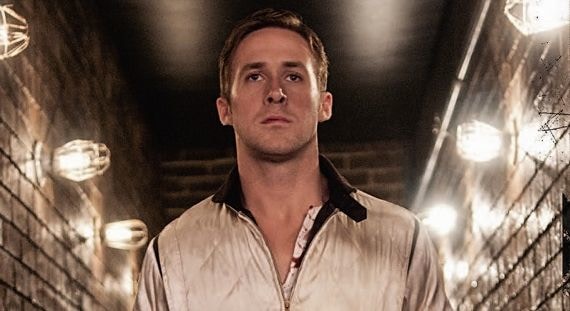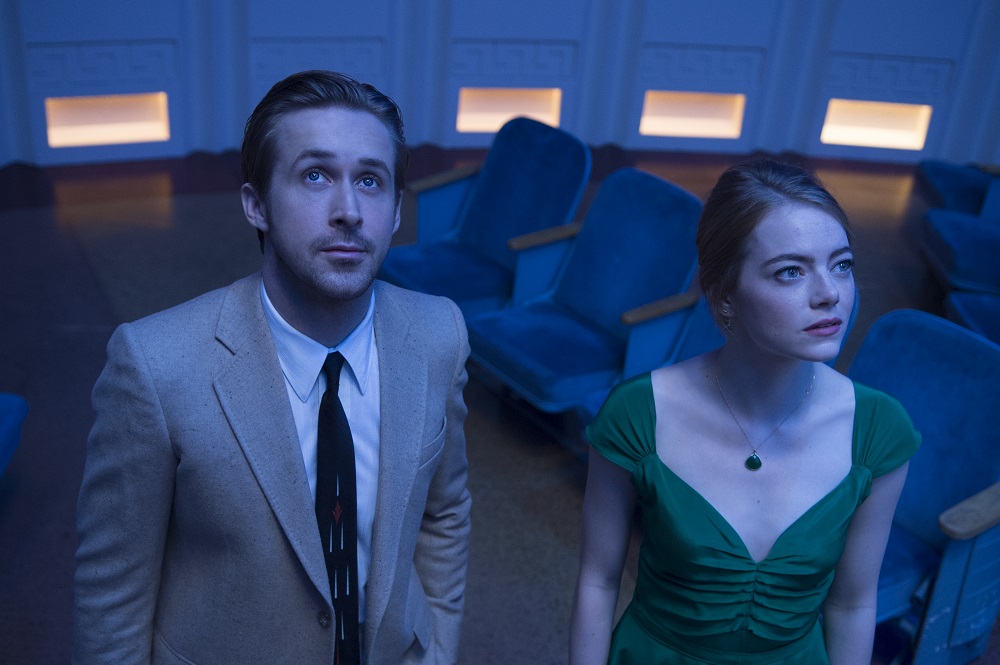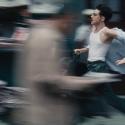Irene (Carey Mulligan) realises just how much the Driver (Ryan Gosling) loves her as his boot caves in a man’s face on the floor of her apartment building lift. They have just kissed for the first time, and she tumbles from him, shaken and repelled. But she can’t stay away, and neither can he, in Nicolas Winding Refn’s Cannes prize-winning tragic action romance.
As its nameless hero, Gosling doesn’t speak for Drive’s first 10 minutes, and is so still in one early scene he looks plastic, only a flick of a finger confirming he breathes, let alone sweats. We see him move smoothly between three high-pressure jobs: getaway driver, Hollywood stunt driver and stock-car racer for his friend, greedy, unlucky old-timer Shannon (Bryan Cranston), who has sought investment from Eighties action-movie producer and current mid-level Jewish mobster, Bernie (Albert Brooks).
Gosling is in an easygoing romcom, Crazy, Stupid, Love, this week too, but a better comparison is the upcoming George Clooney political drama The Ides of March, in which Gosling plays a campaign aide who shares the Driver’s clean-cut, healthy squareness, concealing dangerously unknowable depths.
Mulligan says little more as his apartment-block neighbour, waiting with her little boy Benicio for her husband to get out of jail. They communicate in looks of minutely tremulous longing. She seems to glow when he sees her, an idealised angel, “the best thing that ever happened to me”. Mulligan still makes her frailly real. And when the husband turns up, trailing bad debts to bad men that make the Driver decide to help him on a heist that goes bloodily wrong, the plot becomes a spider web, each thread trailing carnage. Gosling briefly plays him as a blood-spattered nervous wreck when the killing starts, his ice-cool shell cracked, only the desire to protect precious Irene keeping him moving through impossible odds. This is crazy, stupid, doomed love.
The story plays out in a closed world of mid-level criminals and victims, LA noir terrain of anonymous apartment buildings, B-movie sets and pizzerias
Refn’s direction in Drive’s early scenes is all smooth glides and stops, unspoken tensions intimating the disfiguring jolts of panic and violence to come. After his not quite satisfactory British excursions Bronson (2006) and Valhalla Rising (2009), Drive returns the Dane to the dark swagger of his early films - the fated criminality of Pusher (1996), and even crueller romance of Bleeder (1999), which finished with its anti-hero crucified with HIV-infecting syringes. His penchant for sudden, stylised violence sees Gosling hold a hammer and nail over an eye, as topless strippers sit unconcerned in a pulp tableau. Gosling sought him out when Drive was mooted, and its success and his Best Director prize at Cannes have allowed him Hollywood redemption, after his previous US film, Fear X (2003), nearly destroyed his career.
The story plays out in a closed world of mid-level criminals and victims, LA noir terrain of anonymous apartment buildings, B-movie sets and pizzerias. It’s adapted from the novel of the same name by James Sallis, a poetic, humane crime writer whose share in the film’s success will be richly deserved. Cliff Martinez’s pounding synth-rock score meanwhile makes it feel like Refn is remaking some lost 1980s classic of existential action cool – John Carpenter at his most ruthless, or maybe something produced by Drive’s Bernie, played by Albert Brooks, once a sort of LA Woody Allen, here a late-middle-aged urbane mobster who guts arteries with his razor if you let him get close. Like everyone here, he’s surprisingly, perfectly cast. Christina Hendricks, forsaking her pneumatically stylish Mad Men dresses for stilettos and unflattering jeans, burns in a barely written role as a fearful moll.
Drive should confirm Ryan Gosling as the star of the moment, and let Refn leave low-budget purgatory to resume his course as a major director. Though the sum of its parts is quite conventional, those parts glisten and purr.
RYAN GOSLING'S FILMOGRAPHY
Blue Valentine (2010). A controversial break-up melodrama sees things from the male point of view
 Drive (2011). Ryan Gosling's brilliant, bruising ride into LA darkness (pictured)
Drive (2011). Ryan Gosling's brilliant, bruising ride into LA darkness (pictured)
Crazy, Stupid, Love (2011). Ryan Gosling teaches Steve Carell how to score in a film that doesn't
The Ides of March (2011). George Clooney's star-packed morality tale superbly anatomises political chicanery
The Place Beyond the Pines (2013). Derek Cianfrance and Ryan Gosling follow Blue Valentine with an epic tale of cops and robbers
Gangster Squad (2013). Ruben Fleischer swaps zombies for gangsters with mixed results
 Only God Forgives (2013). Nicolas Winding Refn and Ryan Gosling follow Drive with a simmering tale of vengeance
Only God Forgives (2013). Nicolas Winding Refn and Ryan Gosling follow Drive with a simmering tale of vengeance
The Big Short (2015). Director Adam McKay successfully makes a drama out of a crisis
The Nice Guys (2016). Russell Crowe and Ryan Gosling buddy up to crack jokes, bones and crime in 70s LA
La La Land (2017). Ryan Gosling and Emma Stone (pictured above) will have you floating out of the cinema on a cloud














Add comment